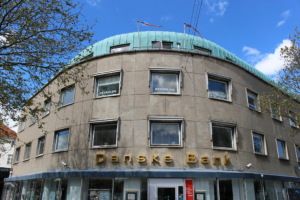News
Business News in Brief: Danske Bank embroiled in Azeri money laundering case
This article is more than 8 years old.
Elsewhere, SAS is flying high, Jutland’s the best for companies and Danish drinks are heading for Kenya

Danske Bank has cleaned up its act (photo: Finn Årup Nielsen)
Danske Bank is embroiled in yet another money laundering scandal – this time involving the regime in Azerbaijan.
According to documents Berlingske newspaper has come into possession of, from 2012-14 the bank permitted the Azeri regime to send money though accounts in the bank’s Estonian branch to politicians, officials and other influential individuals around the world.
Since the contentious transfers took place, and in the wake of the Panama Papers scandal, Danske Bank’s regulations regarding money laundering have become more stringent.
“Until 2014, it is obvious that the big banks, Danske Bank and Nordea, weren’t taking money laundering seriously enough. They also admit that themselves, and since then they’ve been more aware of the risk of money laundering,” Niels Lunde, the editor-in-chief of Børsen newspaper, told TV2 News.
It’s not the first time that Danske Bank has found itself in hot water regarding money laundering cases. Earlier this year it played a key role in a case concerning the money laundering of billions of kroner in Moldova.
SAS flying high
The weather might have been miserable in Denmark, but it’s been all sunshine for Scandinavian airline SAS. The airline posted financial results for the third quarter to the tune of 1.535 billion kroner – almost double the third quarter results from last year. The positive result has prompted the airline to adjust its expectations for the year.
Jutland in good company
According to a new report from the confederation of Danish industry, Dansk Industri (DI), the best place in Denmark to run a company is in Jutland. The report, ‘Local Business Climates’, explored several parameters including opportunities to gain qualified labour, communications with municipalities and tax issues. Copenhagen and Zealand finished rock bottom.
Gotipster sold
The Danish startup Gotipster, which launched in 2016 in a bid to push upmarket takeaway onto the Danish market, has been sold for an unknown million-kroner figure. The company will remain in Danish hands as the new owner, Frokostfirmaet, has purchased 100 percent of the company. The company’s concept will stay the same, but Frokostfirmaet plans to take the business up to the next level.
CO-RO in Kenya
The Danish beverage giant CO-RO has teamed up with Bidco Africa to launch a new beverage business based out of Kenya. The joint venture, BIDCORO Africa, will manufacture a range of new drinks for the Kenyan market under the Dark Berry and Kalangala Kola brands. Frederikssund-based CO-RO, which was founded in 1942 by brothers Flemming and Jep Petersen, has a presence in over 80 countries, employing over 1,200 people.










































